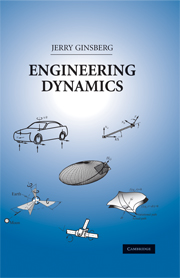Book contents
- Frontmatter
- Contents
- Preface
- Acknowledgments
- 1 Basic Considerations
- 2 Particle Kinematics
- 3 Relative Motion
- 4 Kinematics of Constrained Rigid Bodies
- 5 Inertial Effects for a Rigid Body
- 6 Newton–Euler Equations of Motion
- 7 Introduction to Analytical Mechanics
- 8 Constrained Generalized Coordinates
- 9 Alternative Formulations
- 10 Gyroscopic Effects
- Appendix
- Answers to Selected Homework Problems
- Index
1 - Basic Considerations
Published online by Cambridge University Press: 05 June 2012
- Frontmatter
- Contents
- Preface
- Acknowledgments
- 1 Basic Considerations
- 2 Particle Kinematics
- 3 Relative Motion
- 4 Kinematics of Constrained Rigid Bodies
- 5 Inertial Effects for a Rigid Body
- 6 Newton–Euler Equations of Motion
- 7 Introduction to Analytical Mechanics
- 8 Constrained Generalized Coordinates
- 9 Alternative Formulations
- 10 Gyroscopic Effects
- Appendix
- Answers to Selected Homework Problems
- Index
Summary
Since ancient times many researchers have devoted themselves to predicting and explaining how bodies move under the action of forces. This is the scope of the subject of dynamics, which consists of two phases: kinematics and kinetics. A kinematical analysis entails a quantitative description of the motion of bodies without concern for what is causing the motion. Sometimes that is all that is required, as would be the case if we needed to ascertain the output motion of a gear system or linkage. More significantly, a kinematical analysis will always be a key component of a kinetics study, which analyzes the interplay between forces and motion. Indeed, we will see that the kinematical description provides the skeleton on which the laws of kinetics are applied.
A primary objective will be the development of procedures for applying kinematics and kinetics principles in a logical and consistent manner, so that one may successfully analyze systems that have novel features. Particular emphasis will be placed on three-dimensional systems, some of which feature phenomena that are counterintuitive for those whose experience is limited to systems that move in a plane. A related objective is development of the capability to address realistic situations encountered in current engineering practice.
The scope of this text is limited to situations that are accurately described by the classical laws of physics. The only kinetics laws we will take to be axiomatic are those of Newton, which are accurate whenever the object of interest is moving much more slowly than the speed of light.
- Type
- Chapter
- Information
- Engineering Dynamics , pp. 1 - 29Publisher: Cambridge University PressPrint publication year: 2007



